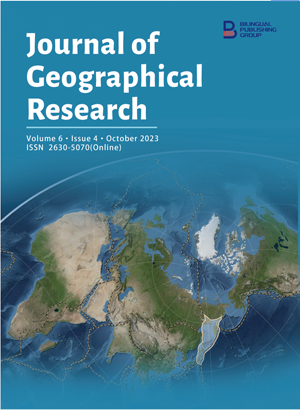-
1426
-
310
-
283
-
280
-
201
Regional Tourism Resilience under Crisis Impacts: The Cases of Yangtze River Delta and Pearl River Delta
DOI:
https://doi.org/10.30564/jgr.v6i4.5942Abstract
Since the beginning of the 21st century, various crisis events have occurred frequently, inflicting substantial impacts on the tourism sector, which has garnered considerable scholarly and policy attention. Nevertheless, limited research has systematically explored tourism resilience at the urban scale, and there is a paucity of studies comparing regional differences in tourism resilience under distinct crisis scenarios and their underlying causes. Thus, this study focuses on the Yangtze River Delta and the Pearl River Delta, employing Martin’s regional economic resilience measurement method. It assesses the tourism resilience of the two regions under the impact of the 2008 financial crisis and the COVID-19 pandemic, subsequently visualizing the data results using ArcGIS software. The study also endeavors to unveil potential causes for disparities in urban tourism resilience. The main conclusions are as follows: Firstly, regions with higher economic development exhibit relatively weaker tourism resilience during economic crises, yet demonstrate comparatively stronger resilience during public crises. Secondly, distinct differentiations exist both between and within the Yangtze River Delta and the Pearl River Delta, primarily stemming from variations such as geographical positioning, tourism resource endowments, and industrial and economic structures, both regionally and within individual cities. Thirdly, the determination of regional tourism resilience is intricate and cannot be restricted to a single dimension; multidimensional indicators better encapsulate the essence of regional tourism resilience.
Keywords:
Tourism resilience; Financial crisis; COVID-19; Impact of crisis events; Spatial differencesReferences
[1] Holling, C.S., 1973. Resilience and stability of ecological systems. Annual Review of Ecology and Systematics. 4(1), 1-23.
[2] Holling, C.S., Gunderson, L.H., 2002. Panarchy: Understanding transformations in human and natural systems. Island Press: Washington, DC.
[3] Liu, Y., Meng, L.K., Cao, Y.H., et al., 2020. Kuo san xing wei ji ying xiang xia gong zhong xin li ren xing kong jian te zheng chu tan (Chinese) [A preliminary exploration of the spatial characteristics of public psychological resilience under the influence of diffuse crisis]. Geoscience. 40(11), 1763-1773. DOI: https://doi.org/10.13249/j.cnki.sgs.2020.11.001
[4] Sun, J.W., Sun, X.Y., 2017. Qu yu jing ji ren xing yan jiu jin zhan he zai zhong guo ying yong de tan suo (Chinese) [Advances in regional economic resilience research and exploration of applications in China]. Economic Geography. 37(10), 1-9.
[5] Butler, R.W., 1980. The concept of a tourist area cycle of evolution: Implications for management of resources. Canadian Geographer/Le Géographe Canadien. 24(1), 5-12.
[6] Cochrane, J., 2010. The sphere of tourism resilience. Tourism Recreation Research. 35(2), 173-185.
[7] Clark, G.E., Moser, S.C., Ratick, S.J., et al., 1998. Assessing the vulnerability of coastal communities to extreme storms: The case of Revere, MA., USA. Mitigation and Adaptation Strategies for Global Change. 3, 59-82.
[8] Sharpley, R., 2005. The tsunami and tourism: A comment. Current Issues in Tourism. 8(4), 344-349.
[9] Faulkner, B., 2001. Towards a framework for tourism disaster management. Tourism Management. 22(2), 135-147.
[10] Tyrrell, T.J., Johnston, R.J., 2006. The economic impacts of tourism: A special issue. Journal of Travel Research. 45(1), 3-7.
[11] Espiner, S., Orchiston, C., Higham, J., 2017. Resilience and sustainability: A complementary relationship? Towards a practical conceptual model for the ustainability-resilience nexus in tourism. Journal of Sustainable Tourism. 25(10), 1385-1400.
[12] Watson, P., Deller, S., 2022. Tourism and economic resilience. Tourism Economics. 28(5), 1193-1215.
[13] Strickland-Munro, J.K., Allison, H.E., Moore, S.A., 2010. Using resilience concepts to investigate the impacts of protected area tourism on communities. Annals of Tourism Research. 37(2), 499-519.
[14] Ruiz-Ballesteros, E., 2011. Social-ecological resilience and community-based tourism: An approach from Agua Blanca, Ecuador. Tourism Management. 32(3), 655-666.
[15] Cui, W.J., Xue, T., 2021. Yue gang ao da wan qu lü you chan ye jing ji ren xing ying xiang yin su yan jiu (Chinese) [A study on the factors influencing the economic resilience of the tourism industry in the Guangdong-Hong Kong-Macao Greater Bay Area]. Special Economic Zone. (12), 26-32.
[16] Zhang, B., Gu, F.Zh., Li, Sh., et al., 2017. Wo guo cheng shi lü you jing ji fa zhan zhong de kong jian te xing fen xi (Chinese) [Study on the spatial effect of urban tourism economy development in China]. Journal of Chongqing Jiaotong University (Social Sciences Edition). (6), 48-53.
[17] Song, H., Dwyer, L., Li, G., et al., 2012. Tourism economics research: A review and assessment. Annals of Tourism Research. 39(3), 1653-1682.
[18] Morakabati, Y., 2020. A question of confidence. Is tourism as vulnerable to civil unrest as we think? A comparative analysis of the impact of Arab Spring on total reserves and tourism receipts. International Journal of Tourism Research. 22(2), 252-265.
[19] Sharma, G.D., Thomas, A., Paul, J., 2021. Reviving tourism industry post-COVID-19: A resilience-based framework. Tourism Management Perspectives. 37, 100786.
[20] Wang, Y., Han, L., Ma, X., 2022. International tourism and economic vulnerability. Annals of Tourism Research. 94, 103388.
[21] Gaki, E., Koufodontis, N.I., 2022. Regional tourism resilience and recovery in times of crises. GeoJournal of Tourism and Geosites. 40, 259-266.
[22] Martin, R., Gardiner, B., 2019. The resilience of cities to economic shocks: A tale of four recessions (and the challenge of Brexit). Papers in Regional Science. 98(4), 1801-1832.
Downloads
How to Cite
Issue
Article Type
License
Copyright © 2023 Yi Liu, Liaofan Chen, Fangfei Han, Tong Zhong

This is an open access article under the Creative Commons Attribution-NonCommercial 4.0 International (CC BY-NC 4.0) License.




 Yi Liu
Yi Liu






